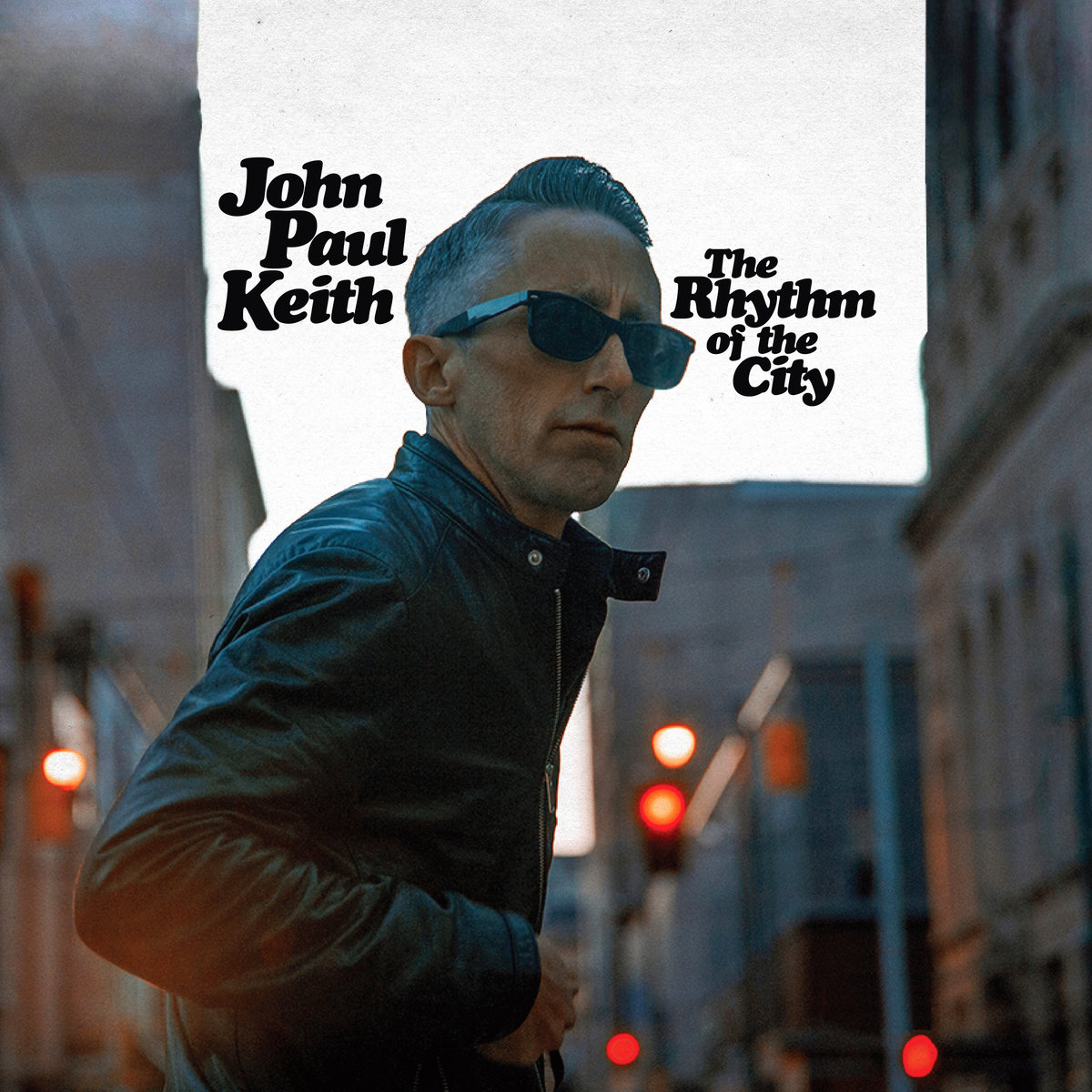
JOHN PAUL KEITH: THE RHYTHM OF THE CITY



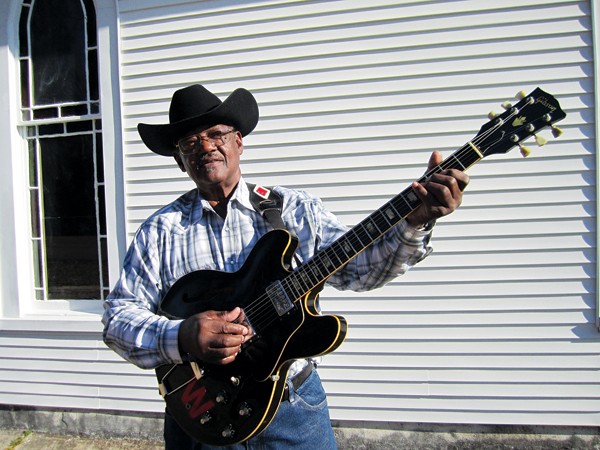
On the morning of October 6, 2020, The Reverend John Wilkins passed
away at the age of 76. A talented guitarist and performer, Wilkins
was enjoying some late in life success thanks to his recently released
albums YOU CAN’T HURRY GOD and TROUBLE. He was a popular performer at
Blues festivals and because of his unique Country/Blues guitar playing
style, many considered Wilkins to be one of the last living links to a
musical period long gone. He is survived by a loving family (some of
whom performed with him at his concerts) and will always be
remembered by members of the church where he was a pastor in Como,
Mississippi.
Born in Memphis in 1943 into a musical family Wilkins began playing
guitar at a young age thanks to his father, pre-war Blues guitarist
Robert Wilkins. Best known for his song “Prodigal Son” (which was
covered by The Rolling Stones in 1968), Robert Wilkins had a career
that started in the late 1920’s but didn’t enjoy mass success until
his “rediscovery” in 1964 as part of the Blues revival. From about
1936 until his rediscovery in ’64 Robert temporarily gave up playing
Blues and began focusing on Gospel music. It was during these years
that young John came into this world and began performing alongside
his father at church. While his father was probably his biggest
influence on his playing directly, John also soaked up the musical
sounds of Memphis during the 50’s and 60’s. He would go on to do
studio sessions and play in various groups around the city before
eventually settling down and becoming a pastor of the Hunter Chapel in
Como, Mississippi in 1985.
Even though Hunter Chapel had its fair share of blues musicians as
part of their congregation over the years once Wilkins took over as
pastor he gave up playing guitar entirely. He finally picked it up
again in 2003 after he attended a funeral for his friend, musician
Otha Turner. Inspired to pick up playing music again he got back into
performing and in 2010 he released his debut album YOU CAN’T HURRY GOD
(Big Legal Mess Records). The record was well received by many and
soon Wilkins found himself bringing the sound of the Mississippi Hill
Country (or as Wilkins called it “Hand-clappin’ foot-stompin” music)
to places like London and Paris. He became a major fixture at Blues
festivals all over the world and in 2019 recorded a follow up album.
All seemed to be going well for Wilkins and his family until April
2019 when he contracted COVID. Like many who have contracted the
disease Wilkins first found himself having trouble breathing and
feeling like he had the flu. He phoned his daughter and was quickly
admitted to a local hospital where he was hooked up on a respirator.
He stayed in the ICU for 5 weeks before his health slowly started to
improve. Then in mid June, Wilkins got the good news he was all clear
and returned home! Not long after his release from the Hospital he
released the album TROUBLE (Goner Records) that he recorded in 2019.
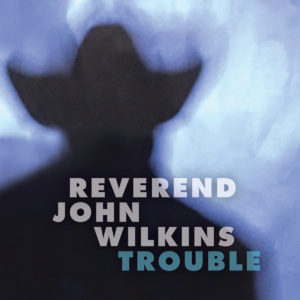
Recorded in Memphis at the legendary Royal Studios, TROUBLE was
finally released September 18th, 2020 and received rave reviews upon
its release . Formally the recording home of Willie Mitchell’s
Hi-Records (Al Green, Syl Johnson, Ann Peebles) Royal Studios has been
one of the prominent spots to record in the south since 1957. The
recording session was sort of a homecoming for Wilkins as he performed
on sessions here in his earlier years. The studio is also known for
taking Soul music to the next level in the 60’s and 70. So, it seems
only fitting that the album Wilkins recorded here would be musically
diverse. Featuring a little something for everyone, TROUBLE is truly a
Memphis record. Here we find Wilkins and his band mixing Country and
Soul along with their normal mix of Blues and Gospel thus giving the
album more of a “Southern Soul” feel then his previous record. It also
must be said that one of highlights on this record is hearing Wilkins’
own daughters perform alongside him.  Tangela Longstreet, Joyce Jones, Tawana Cunningham are all very talented in their own right and give the band sort of a Staple Singers sound on tunes like “Wade In The Water”, “Walk With Me”, and “Darkest Hour”.
If there’s any part of TROUBLE that is a bummer it’s that Wilkins
wasn’t alive long enough to see it enjoyed by his fans. As previously
mentioned he passed away October 6, 2020 from unknown causes. While he
will be missed by many all over the world we are fortunate he left us
two wonderful albums of music along with a lifetime of memories.
Hopefully his music will live on and find new listeners in the years
to come. After all, who doesn’t love some good Hand-clappin, foot-stompin’ music!
REV. JOHN WILKINS albums are currently available for streaming on Spotify and for purchase through most on-line retailers.Â
YOU CAN’T HURRY GOD (Big Legal Mess Records) 2010
TROUBLE (Goner Records) 2020
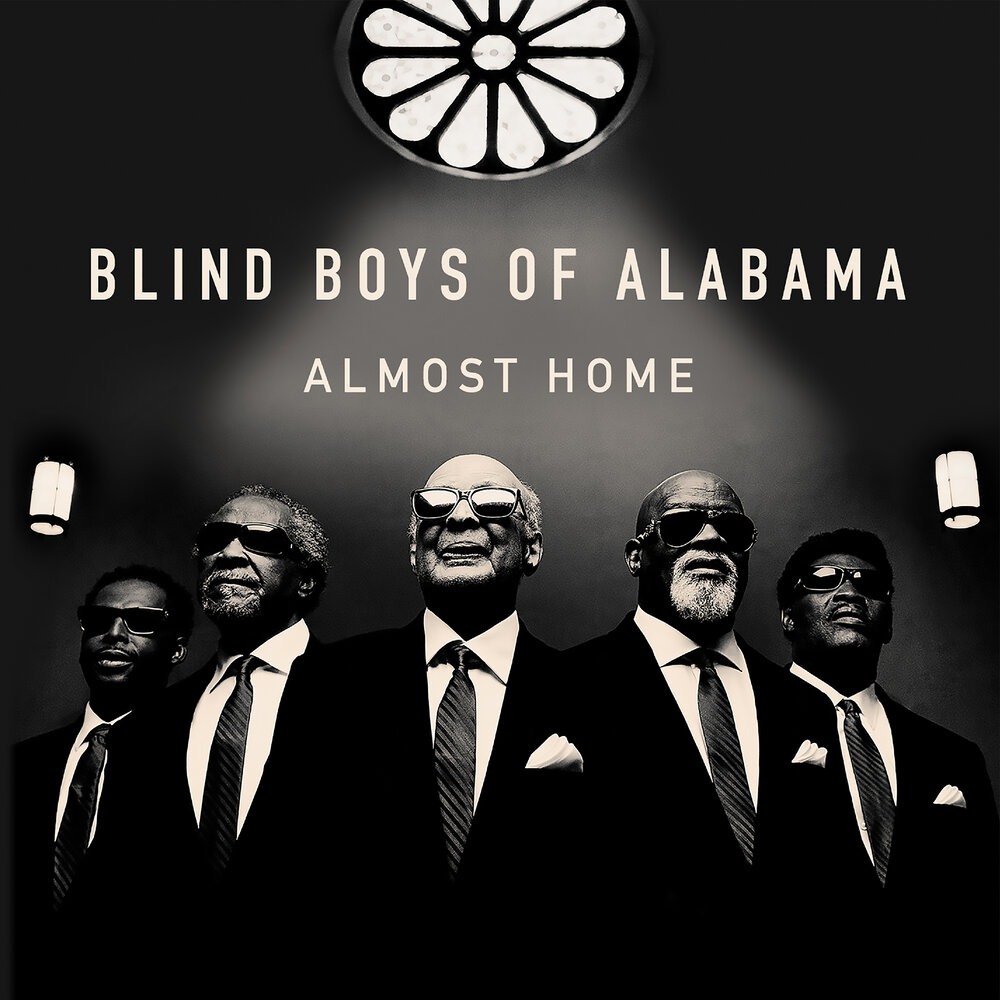
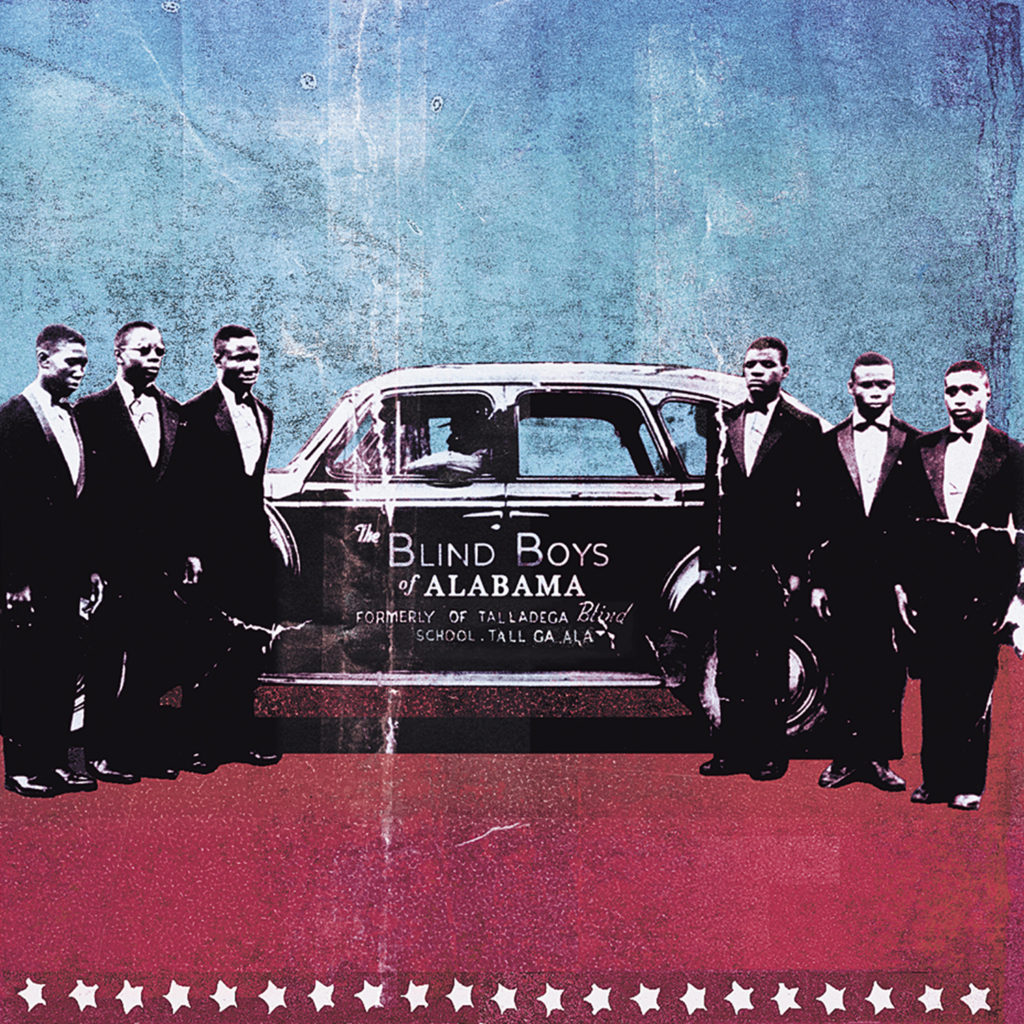
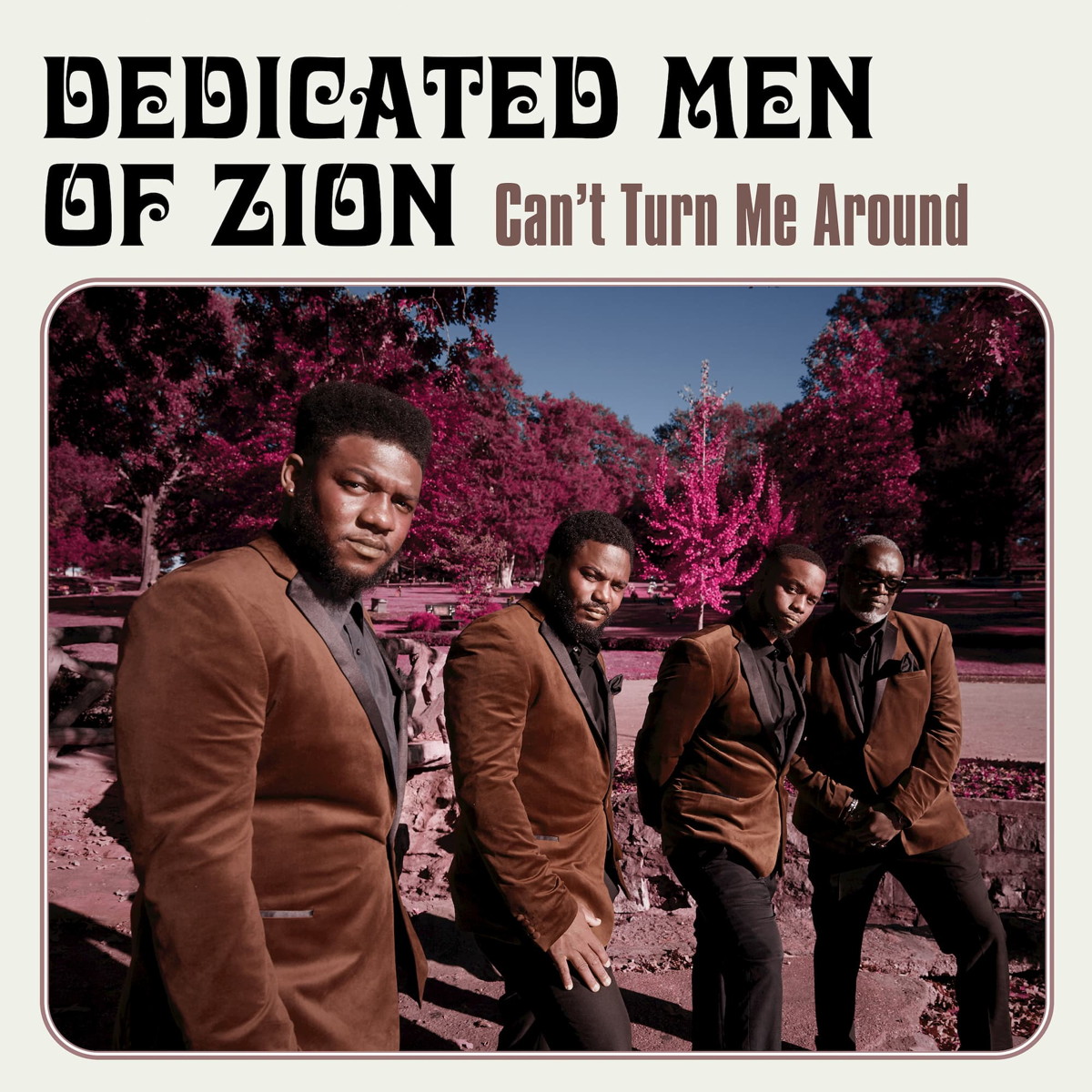
CAN’T TURN ME AROUNDÂ Bible & Tire Records
For fans of Sharon Jones and The Dap Kings, The Blind Boys of Alabama, and The Staple Singers
The new record from the Dedicated Men of Zion reminds us that the lines between traditional gospel and R&B are blurry at best. Filled with foot-stomping rockers and swinging soulful ballads, CAN’T TURN ME AROUND, is just as appropriate for Saturday Night as it is for Sunday morning. Hailing from rural North Carolina the group has gone through a number of lineup changes since it’s incarnation in 2014. In 2018 the group’s current lineup, consisting of Anthony Daniels, Antoine Daniels, Dexter Weaver, and Marcus Sugg caught the attention of The Music Maker Relief Fund. The Music Maker Relief Fund is a non-profit organization that helps musicians in the rural south meet their day-to-day needs and promote their music. Even though the band was already popular regionally, working with the Music Maker Relief fund helped the group reach a larger audience and eventually find the ears of Bruce Watson’s Bible & Tire Record label.
 The bottom line is that The Dedicated Men of Zion’s new record CAN’T TURN ME AROUND is a record that is desperately needed today. It’s inspiring, hopeful, and most of all reminds us that yes, things have been bad before but if we work together we can survive this and make it to the promised land.. whatever you deem that to be.

Born in Arkansas in 1915 Sister Rosetta Tharpe influenced Rock and Popular music more then most people know. A young Little Richard got his start by opening for her before anybody knew who he was. Elvis, Johnny Cash, and Bob Dylan all cite Sister Rosetta as a major influence, and during her heyday she performed for stadium sized crowds all over the world. In short, Sister Rosetta was a rockstar before Rock n’ Roll even existed.
 Soul Jazz RecordsÂ
For fans of James Brown, Irma Thomas, Tina Turner, and The Meters
When you think of the greatest Soul singers of all time you probably don’t think of the name Betty Harris. Despite being as talented as superstars like Tina Turner and Etta James, Ms. Harris isn’t a household name. During the 1960’s she only released a handful of singles and only a few of those became hits. She then retired in 1970 to focus on her family. While her music has become very popular among Soul record collectors and aficionados over the years, it has never reached a mass audience. Fortunately the good folks at Soul Jazz Records are trying to change that with their recent release, BETTY HARRIS: THE LOST QUEEN OF NEW ORLEANS SOUL!
THE BEGINNING
Born in Orlando FL, in 1941 (or possibly 1939) Ms. Harris started out singing gospel music when she was very young. Part of a very religious family, Harris wasn’t allowed to sing secular music while under her parent’s roof. She left home in her late teens to perform Blues and Soul music in California. After several years on the West Coast she moved to New York City where she hooked up with songwriter/producer Bert Berns. In 1963 she recorded her first hit, “Cry To Me”, a slow rendition of a tune singer Solomon Burke had recorded a year earlier. The song became a big hit for Harris and actually surpassed Burke’s original recording on the national charts! The success of “Cry To Me” inspired a few more releases from the Berns/Harris team including a fiery number called “Mo Jo Hannah”. Unfortunately none of these other recordings because hits and Burns and Harris went their separate ways.
WORKING WITH ALLEN TOUSSAINT
Shortly after her relationship with Burt Berns ended Harris met master Musican/Songwriter Allen Toussaint and began recording for his New Orleans based record label Sansu. Even though only one of the singles she recorded for Sansu charted nationally, the recordings she made while at the label are classic and make up the material on BETTY HARRIS: THE LOST QUEEN OF NEW ORLEANS SOUL. The music on this compilation is all killer-no-filler and ranges from classic R&B to hard funk! While it’s Harris’ larger-then-life vocals that commands the most attention on these songs we must also note that the backing band is made up of some of New Orleans’ finest musicians, including members of the legendary Funk group, The Meters. Like the Funk Brothers at Motown or Booker T. & The MG’s at STAX, The Meters are as important to the recording as the artist they are supporting. Finally, we must also acknowledge that none of these recordings would’ve been possible without master musician/producer Allen Toussiant behind the board. Not only do his talents as a producer take these recordings to another level, he also wrote almost all of these songs!
Mavis Staples is a living legend. Over the past 60 years she’s not only brought Gospel music to the masses but she’s also been a voice of hope and strength for those fighting for Civil Rights. Her career started in Chicago during the late 1940’s when she and her siblings would perform in churches alongside their father, the legendary Roebuck “Pops†Staples. With a sound that was rooted in Southern Gospel and Delta Blues “The Staple Singers†soon became local favorites and in the early 50′s began recording sides for labels like VeeJay, Riverside, and Checker. In addition to gospel music fans the band was also embraced by the folk music scene during the folk revival of late 50′s and early 60′s. It was during this time that the band became very active in the civil rights movement and regularly performed at rallies and events hosted by Dr. Martin Luther King.
In the late 60′s and early 70′s the music scene was changing and the band changed right along with it. They signed with the legendary STAX Records and under the guidance of STAX A&R man Al Bell they started adopting more of a Soul-Gospel style. Their music might have become a little funkier but it still contained the same message of hope, love and compassion. Songs like “Respect Yourself“, and “I’ll Take You There†made the band a household name and catapulted them into stardom. Unfortunately, due to some questionable business decisions by Al Bell STAX Records filed for bankruptcy in 1975 and was forced to shutdown.
The Staples pressed on and over the next several years put out several releases for a variety of different labels. While they had success with their 1975 album LET’S DO IT AGAIN the group mostly was out of the spotlight until the 1990’s. During the 2000’s Mavis continued to perform and release solo albums. Paired with producers such as Ry Cooder and Wilco’s Jeff Tweedy, these records introduced Mavis to a whole new audience. In 2013 her Jeff Tweedy-produced album You Are Not Alone won a Grammy for “Best Americana Album”.
This year Mavis will turn 75 years young and she’s just as popular as ever. People all over the world still cram into venues to see her perform and she’s a regular musical guest on late-nite TV. Her music still carries with it a message of hope and tolerance. A message that reminds us that even though there have been victories in the struggle for civil rights, the fight is far from over.
STAPLE SINGERS/MAVIS STAPLES SUGGESTED LISTENING
The Staple Singers: Uncloudy Day (VeeJay)
The Staple Singers: Freedom Highway (Epic/Legacy)
The Staple Singers: Be Attitude: Respect Yourself (Stax)
The Staple Singers: The Staple Swingers (Stax)
The Staple Singers: The Best of The Staple Singers (Stax)
Mavis Staples: We’ll Never Turn Back (Anti) produced by Ry Cooder
Mavis Staples: You Are Not Alone (Anti) produced by Jeff Tweedy
Mavis Staples: One True Vine (Anti) produced by Jeff Tweedy
LEE FIELDS & THE EXPRESSIONS EMMA JEAN Truth & Soul Records
For Fans of: Issac Hayes, James Brown, Solomon Burke, and Charles Bradley
This summer Lee Fields & The Expressions are back on the scene with a new record full of sweet soul music! Entitled Emma Jean in honor of Lee’s late mother, this record finds the band incorporating more elements of Folk and Gospel into their sound more then they have in the past. In fact, the album’s first single is a soulful version of the J.J. Cale tune “Magnolia”. Sounding a little like Solomon Burke, Lee croons his way through this Folk classic with help from pedal-steel guitar master Russ Pahl. While the song is stylistically a little different then songs Lee and his band have done in the past, they still sound great. That being said, Emma Jean has something for everyone. Fans of classic hard-soul will enjoy songs like “In the Woods” and “Stone Angel” while fans of the teary-eyed ballads will have a new favorite song in “Don’t Leave Me This Way”. The album’s standout track however is the piano-driven “Eye to Eye”. In this song the band sways back and forth while Lee pleads with his lover to take him back. Singing like his life depends on it, Lee is clearly still at the top of his game. For a guy who’s been releasing music since 1969, this album might be his crowning achievement.
RESPECT YOURSELF: THE STORY OF STAX RECORDS Bloomsbury USA
Author Robert Gordon has been writing about the music of Memphis for almost 30 years. In Respect Yourself: The Story of STAX Records Mr. Gordon not only tells the story of STAX but also the story of the Civil Rights movement in Memphis.  Passionately written and meticulously researched this book takes you from the label’s meager beginnings in a garage outside Memphis to it’s bankruptcy in 1975.  Along with Mr. Gordon’s narration you hear from the people that made STAX happen, making this book one of a kind.
A LITTLE STAX HISTORY…
Started by Jim Stewart and his sister Estelle Axton in 1957, STAX Records was more then just a record label. It was a voice in the community. The label’s open door policy made it possible for anyone to come in off the street and set up an audition. It didn’t matter where you were from or what the color of your skin was, you were welcomed at STAX as long as you had a passion for music.
Right from the beginning STAX did things it’s own way. Segregation may have been alive and well in Memphis during the 1960’s, but that didn’t stop STAX founder Jim Stewart from hiring an African American DJ named Al Bell to be his lead promotions man. Â Working together side by side Jim, Estelle, and Al turned STAX records from a little indie label into a household name! Â STAX artists like Otis Redding, Booker T. & The MG’s, Carla Thomas, and William Bell put the label on the map with singles that started appearing on the R&B and Pop charts. Â Money was coming in and things were really rolling, until one very dark December day in 1967…
Today many people can remember exactly where they were when they learned that the plane carrying Otis Redding and The Bar-Keys went down. Otis was the soul of STAX and the voice of soul music. Â A few months later while the people of STAX were still grieving over the loss of Otis and the Bar Keys their world was rocked again. Â On the evening of April 4, 1968 Â Dr. Martin Luther King was assassinated at the Lorraine Motel in Memphis. Â Needless to say, after the assassination of Dr. King everything was different, especially in Memphis. Â If all this wasn’t enough, Â the label’s distributor Atlantic Records ended it’s relationship with STAX. Â With it’s biggest star gone and no way to get music to the stores most label’s would have called it a day, but most labels didn’t have Al Bell. Â It was then that Al and the folks at STAX hunkered down and staged one of the biggest comebacks in music history.
The early 70’s found STAX again at the top of the Soul music world. This time around STAX would reach heights that were even greater then it did in the 1960’s. Al Bell gained full control of the label and STAX rode the success of artists like Isaac Hayes, The Emotions, Johnnie Taylor, and The Staple Singers all the way to the top of the charts. Sadly this rebirth would be short lived as some questionable business decisions and over expatiation lead to STAX eventually having to declaring bankruptcy in 1975.
All that said, STAX has lived on in many different ways. Many of their artists are still celebrated today and have found new audiences. Artists such as William Bell, Mavis Staples, and Eddie Floyd still perform and continue to release new music while others like Sam Moore are mostly retired but still appear at the occasional music festival. The studio was rebuilt and is now a museum (possibly the best museum in Memphis not named The National Civil Rights museum). There is also the Stax Music Academy, a music school that is focused on providing music education to local youth. So while the days of Otis roaming the halls and Al Bell running the office might be gone all is not lost. The future of Stax is very bright.
Charles Bradley “Victim Of Love” Daptone/Dunham Records
If you’ve every heard Charles Bradley you know he’s the real deal. From his James Brown like scream to his energetic stage show Mr. Bradley doesn’t just sing Soul music he LIVES IT. For those who aren’t aware, Charles Bradley was discovered while working as a James Brown impersonator in clubs around Brooklyn, New York when he caught the ear of Daptone Records co-founder Gabriel Roth. He released his debut album, NO TIME FOR DREAMING, in 2011 at the age of 63 after a lifetime of playing clubs and working odd jobs to make ends meet.  The album was a success and sent Mr. Bradley on tour across the U.S., Europe, and Canada. Now at an age when most artists are slowing down the big man returns with a new album entitled VICTIM OF LOVE, his second release for Dunham/Daptone Records.
VICTIM OF LOVE finds Mr. Bradley again backed by Menahan Street Band, a group of young but seasoned players that co-wrote NO TIME FOR DREAMING with him. The album’s gritty sound isn’t much different then Mr. Bradley’s first release but as they say, if it ain’t broke why try to fix it? Mr. Bradley screams and shouts as he tells the listener about the ups and downs of real life and the band is tight while still sounding human. Tunes like “Strictly Reserved For You”, “Love Bug Blues” and “Where Do We Go From Here?” are perfectly suited for Mr. Bradley’s voice and could have sounded right at home on his last album.  “You Put The Flame On Me” is an upbeat shuffle that is reminiscent of early Al Green and the title track “Victim of Love” is a beautiful love song that will become a slow dance classic. All that being said, the money-shot on this album is the album’s closer “Through The Storm”. On this balled Mr. Bradley offers thanks to those who’ve helped him through the hard times. If you’ve ever seen him perform live you know that on many occasions he ends the show by walking into the crowd and hugging members of the audience. It’s no surprise that a song of hope and love would be the song to end the second album. Here’s hoping Mr. Bradley will be around for a long time to come.